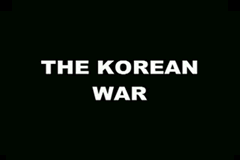 |
|
| The History of America at War - Focus: The Korean War | ||||||||
In September of 1948, during the height of the Cold War, the USSR installed a Communist government in North Korea. That government promoted and supported an insurgency into South Korea in an attempt to bring down the recognized government there and gain Communist jurisdiction over the entire Korean peninsula. Approximately two years later, after the insurgency showed signs of failing, the northern government undertook a direct attack, sending the North Korea People's Army south across the 38th parallel before daylight on Sunday, June 25, 1950. The invasion marked the beginning of a civil war between peoples of a divided country. In a larger sense, the cold war between the United States and the USSR had erupted in open hostilities. By the time General MacArthur received word to commit ground units, the North Korean force had already taken Seole and crossed the Han River. General MacArthur knew that the deeper the North Koreans drove, the more vulnerable they would become to an amphibious envelopment. A force landing at Inch'on would have to move inland only a short distance to cut North Korean supply routes. The X Corps swept into Inch'on on September 15 against light resistance and steadily pushed inland over the next two weeks. MacArthur returned the capital city to President Rhee on September 29. Meanwhile, about 30,000 North Korean troops escaped above the 38th parallel through the eastern mountains. President Truman, to this point, frequently had described the American-led effort in Korea as a "police action.” Determined to halt the aggression, he was equally determined to limit hostilities to the peninsula and to avoid taking steps that would prompt Soviet or Chinese participation. In re-establishing the old border, the UNC had met the U.N. call for assistance in repelling the attack on South Korea prior to the invasion from the north." A halt, furthermore, would be consistent with the U.S. policy of containment. There was, on the other hand, substantial military reason to carry the war into North Korea. Failure to destroy the 30,000 North Korean troops who had escaped above the parallel and an estimated 30,000 more in northern training camps, could leave South Korea in little better position than before the start of hostilities. Complete military victory was within easy grasp. This would also achieve the U.S. and U.N. objective of reunifying Korea. Ten days later, the U.N. General Assembly voted for the restoration of peace and security throughout Korea, thereby giving tacit approval to the UNC's entry into North Korea. When the Chinese were discovered fighting in the war General Mac Arthur knew that it would change our entire outlook of the war. On the following day he instructed General Walker to make whatever withdrawals were necessary to escape being enveloped by Chinese. By December 15 he was completely out of contact with the Chinese and was back at the 38th parallel. The main concern in Washington was the possibility that the Chinese entry into Korea was only one part of a USSR move toward global war, a concern great enough to lead President Truman to declare a state of national emergency. Washington officials, in any event, considered Korea no place to become involved in a major war. For all of these reasons, the Joint Chiefs of Staff notified MacArthur that a major build-up of UNC forces was out of the question. Since the Chinese intervention, the United States and other members of the UNC coalition by that time were willing, as they had not been the past autumn, to accept the clearance of enemy troops from South Korea as a suitable final result of their effort. The main scene then shifted to Geneva, Switzerland, where the political conference recommended in the armistice agreement convened on April 26. There was a complete impasse from the beginning: the representatives of UNC member nations wanted to reunify Korea through elections supervised by the United Nations; the Communist delegation refused to recognize the U.N.'s authority to deal with the matter. The war's impact reached far beyond Korea. Despite criticism of the armistice the UNC had upheld the U.N. principle of suppressing armed aggression. More far reaching was the war's impact on the two Superpowers. The primary result for the western bloc was a decided strengthening of the NATO alliance. Virtually without military power in June 1950, NATO could call on fifty divisions and strong air and naval contingents by 1953 - a build-up directly attributable to the increased threat of general war seen in the outbreak of hostilities in Korea. With further reinforcement in the NATO forecast at the end of the Korean War, USSR armed aggression in western Europe became unlikely. Outside these direct impacts of the war, the relative positions of west and east also had been affected during the war years by the development of thermonuclear devices. The United States exploded its first such device in 1952, the USSR in August 1953. The exact consequences of all these changes were incalculable. But it was certain that the cold war would continue and that both Superpowers would face new challenges and new responses. |
||||||||
This website designed, constructed, programmed, and powered by 4D Solutions, Inc.
